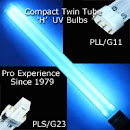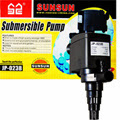Our Facebook Page to Follow: Aquarium/Pond Answers Facebook
This is a unique resource for answers, help, & advice to aquarium and pond questions not found elsewhere; With regular posts & article updates.
In our research; we use aquaculture, horticulture, medical, & university research to compile many of our articles.Our Recommended Lighting for highest efficiency professional planted/reef aquariums: "AquaRay Lighting"
Cyclops, Are these freshwater copepods dangerous in an Aquarium?
Information about Cyclops and also Predatory Damselfly larvae that occasionally find their way into aquariums and especially ponds
QUESTION: I have these bugs in my aquarium; they are very small about 2-3 mm long with one black eye in the middle of its head. It is grayish in color. It goes jerking through water in rather spastic motions. ADVERTISEMENT REPRODUCTION: CONCLUSION (& Removal): Other Recommended Reference & Product Sites
ADVERTISEMENT Labels: copepods, Cyclops, Damselfly larvaeAquarium, dangerous, freshwater, Predatory
What are these?
ANSWER:
Is this your bug?
This is one possibility, which is a Cyclops (a type of copepod); they range in size from 1-3 mm. It is called a Cyclops because of the single eye spot. This female carries two packages of eggs near the base of her tail. The Cyclops has 5 pair of legs and a divided tail-like appendage called a furca (A forked process as the last abdominal segment of certain crustaceans).
Cyclops are crustaceans and related to lobsters, crabs and shrimp.
A little about Cyclops;
HABITAT: Cyclops live in freshwater, such as ponds and lakes. They prefer areas of still water with a lot of algae.
THEIR PLACE IN THE FOOD CHAIN:
Cyclops are omnivores; they eat algae, small animals, detritus but not usually fish. But weak fry MAY be harmed by these copepods.
Some species of Cyclops are not free-living, existing instead as fish parasites, but these are not common.
Tropical and native fish enthusiasts utilize the cyclopoids as a high protein live fish food, especially for immature fishes, and in a fair twist of fate, some Cyclops species have been found feasting on larval fishes, particularly in fish hatcheries.
For more about proper fish food nutrition:
Fish Nutrition; What ingredients are needed for best fish nutrition, growth and health
Cyclops are generally eaten by Phantom Midge Larvae and water mites.
The female Cyclops carries her eggs at the back of her body. There are fewer males than females present in the population, and the males are smaller.
Females are often observed while swimming to have paired egg sacs, and most of the species are capable of explosive outbreaks when the water temperature and other conditions are optimal.
DAMSELFLY LARVAE:  Another possibility is a larval damselfly, which are much larger, about 1/4" or more (although this does not fit the above description, however I have seen these in ponds).
Another possibility is a larval damselfly, which are much larger, about 1/4" or more (although this does not fit the above description, however I have seen these in ponds).
The larval damselfly is more predatory, but will not reproduce in your aquarium (unless you have damselflies flying around the inside of your home!).
These are best hand removed (or vacuumed). Once these are gone, they are gone!
Cyclops can also be intermediary hosts to the Guinea worm (which affects humans, but not generally fish) and fish tapeworm.
These are rare occurrences for the Cyclops, and many aquarists consider them valuable as a fish food and even sell them.
I would not be overly concerned with them for most aquariums as long as good aquarium cleaning methods, such as vacuuming are practiced; in fact as noted earlier they actually make a nutritious fish food.
The exception would probably be with fish breeding. In this case, vacuuming gravel and rinsing off live plants in a mild bleach solution (live plants can handle a 25/1 solution provided it is rinsed off) would be in order. Keep in mind that these copepods do not like areas of high current and do like a lot of algae, so changing these conditions would go a long way in controlling Cyclops.
Gravel Vacuum Product Link: Aquarium Vacuums
If normal maintenance methods fail to remove the Cyclops or similar Copepods, chemical removal methods can be used.
There are four methods I have used and can recommend based on results and safety (there may be other methods):
This is probably the quickest/most effective method of copepod removal that never fails when used as per directions. The problem with Clout is there are many fish that this product should not be used with, including: Piranhas, Silver Dollars, Tinfoil Barbs, Metynnis species, scaleless fish, bottom feeders.
Effective for the treatment of Chilodinella, Trichodina, and most external parasitic protozoan infections
An excellent choice for worms in particular, but also for general internal and external parasite control.
Superior in safety to Fenbendazole & Levamisole. More effective than Praziquantel
Do not use Ich treatments or other single cell parasite treatments.
Treatment Method Product Links:
*Cupramine from AAP
*AAP Paracide
*AAP Dyacide (Dylox)
*AAP Piperazine/Pipzine
For other Fish Food Product Resources:
*Fish Foods; Hikari, Spirulina 20, Aqua Master, Kahoja
 -A useful source for current Aquarium & Pond Information and Resources
-A useful source for current Aquarium & Pond Information and Resources
*Aquarium, Fish Parasites, Worms; Planaria, Nematodes, Detritus, Anchor
*Aquarium Ich, Treatment, Prevention
*Planaria or Detritus Worms in Aquarium?
UV-C Replacement Bulbs Page 1
For TRUE High Output, Hot Cathode, Low Pressure UVC Germicidal Bulbs, for aquarium or pond

Nutramar Nori- Seaweed
An excellent food source for many Herbivores

Aquarium Lighting, Complete Information AAP JT-132 Pro Pump; Aquarium Power Head Water Pumps
AAP JT-132 Pro Pump; Aquarium Power Head Water Pumps
Superior performance and value when compared to many more well known brands such as Hagen or Marineland







